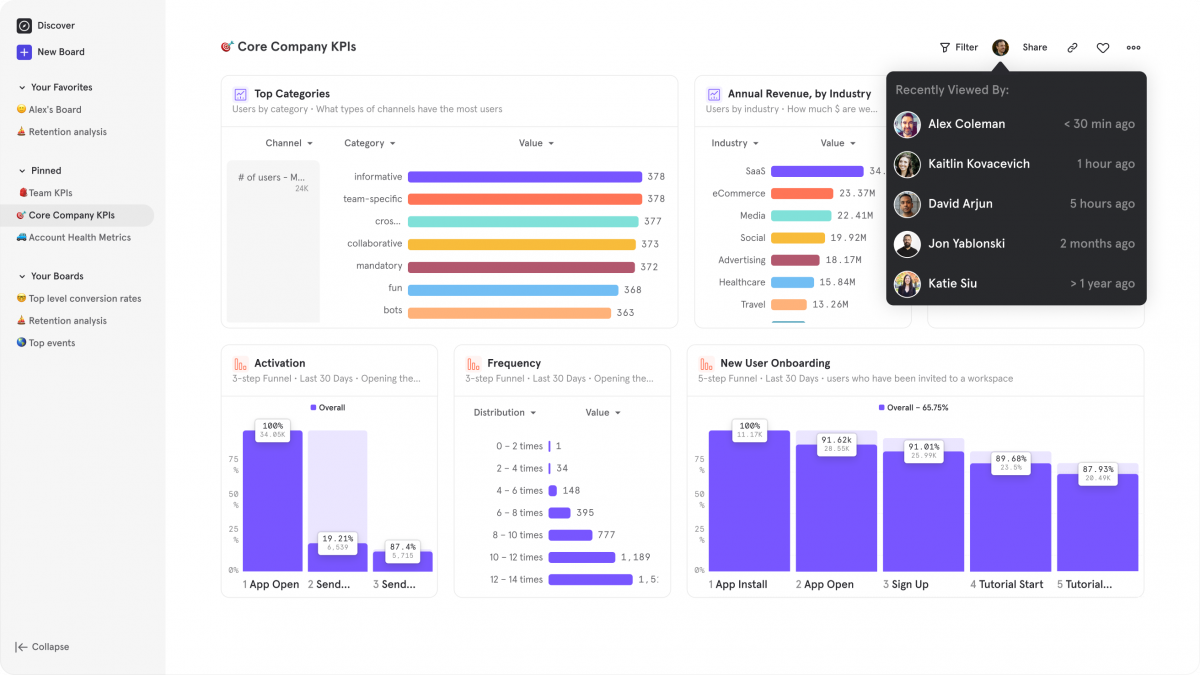
10 Best Business Analytical Tools for Digital Marketing in 2025
Apr 22, 2025 9 Min Read 3138 Views
(Last Updated)
Consider this famous quote
“Data is the new oil. It’s valuable, but if unrefined it cannot really be used. It has to be changed into gas, plastic, chemicals, etc. to create a valuable entity that drives profitable activity; so data must be broken down, analyzed for it to have value.”
Clive Humby, Circa 2006
This statement holds especially true in digital marketing, where raw data from various channels must be meticulously analyzed and refined to uncover actionable insights. These insights enable marketers to optimize their strategies, improve customer engagement, and ultimately drive profitability. Data is truly every marketer’s real friend.
A compelling example of the power of digital marketing analytics is seen in the case of Rock Content. By integrating HubSpot’s tools, Rock Content achieved a staggering 650% increase in revenue. This transformation was driven by aligning their sales and marketing processes through comprehensive data analysis, illustrating the critical role of robust analytics tools in modern marketing strategies.
In this post, we’ll dive into a list of top business analytical tools that can transform your digital marketing approach and lead you to success.
Table of contents
- Understanding Business Analytics: A Game-Changer for Digital Marketing
- What Are Business Analytical Tools?
- Top Business Analytical Tools Available Today
- Google Analytics
- Zoho Social
- HubSpot Marketing Hub
- Mixpanel
- Tableau
- Power BI by Microsoft
- Hotjar
- KlipFolio
- SproutLoud
- Aherfs
- Departing Words
- FAQs
- What are business analytics tools in digital marketing?
- How do I choose the right analytics tool for my business?
- Why is data important in digital marketing?
Understanding Business Analytics: A Game-Changer for Digital Marketing
Business analytics in digital marketing involves the systematic analysis of data to inform and optimize marketing strategies. It’s about gathering data from various digital channels such as social media, websites, and email campaigns, and then analyzing this data to gain insights into customer behavior and campaign performance. This process helps marketers understand what’s working, what’s not, and where to focus their efforts for the best results.
At its core, business analytics in digital marketing encompasses techniques like data mining, predictive analytics, and statistical analysis. By leveraging these techniques, marketers can identify trends, forecast outcomes, and make data-driven decisions. For example, analyzing website traffic data can reveal which sources bring in the most visitors and which pages convert the most leads. This information is crucial for refining marketing campaigns and ensuring resources are allocated effectively.
Must Find Out 6 Reasons Business Analytics Makes Digital Marketing Powerful
As we proceed to the next section, consider getting started with GUVI’s Business Analytics and Digital Marketing Course with Placement Assistance, which lets you gain practical experience by developing real-world projects and covers technologies including Power BI, Excel, SQL, Tableau, Data Visualization, etc. for a thorough hold over the field.
What Are Business Analytical Tools?
Business analytical tools are software applications that collect, process, and analyze data to provide actionable insights. These tools are essential for marketers who want to make data-driven decisions, as they simplify the complex process of data analysis and present information in an easily digestible format.
These tools help marketers track key performance indicators (KPIs), measure the effectiveness of their campaigns, and uncover insights that can drive better marketing strategies. By using business analytical tools, marketers can ensure they are making informed decisions based on reliable data.
Also, Know About the Top 9 Business Analytics Skills You Should Know
Top Business Analytical Tools Available Today
Here are some of the widely used business analytics tools on the market:
| Tool Name | Starting Price | Free Version Available? | Free Trial | Annual Discount | Additional Info |
|---|---|---|---|---|---|
| Google Analytics | Free | Yes | N/A | N/A | In-depth website analytics and real-time data. |
| Zoho Social | $10/month | Yes | 15 days | Yes | Real-time monitoring and detailed analytics. |
| HubSpot Marketing Software | $50/month | Yes | 14 days | Yes | Comprehensive marketing automation and analytics. |
| Mixpanel | $25/month | Yes | 14 days | Yes | Real-time data and advanced segmentation. |
| Tableau | $70/month | No | 14 days | Yes | Interactive data visualization and advanced analytics. |
| Power BI | $9.99/month | Yes | 30 days | Yes | Integration with Microsoft products and AI-driven insights. |
| Hotjar | $39/month | Yes | 15 days | Yes | Heatmaps and session recordings for user behavior insights. |
| Klipfolio | $24/month | No | 14 days | Yes | Customizable dashboards and real-time updates. |
| SproutLoud | Contact for pricing | No | N/A | N/A | Centralized local marketing management. |
| Ahrefs | $99/month | No | 7 days | Yes | Comprehensive SEO tools and competitive analysis. |
1. Google Analytics
When considering digital marketing analytics tools, Google Analytics stands out as one of the most essential and robust options available, and it’s free to use.
Most digital marketers and webmasters would agree that it’s hard to imagine working without Google Analytics. This tool dives deep into various metrics, providing comprehensive insights into website traffic, user behavior, and conversion rates.
Google Analytics excels in website analytics, offering a plethora of valuable insights into the customer journey. It effectively uncovers trends in traffic, identifies sources of visits, and assesses user engagement levels. These insights are crucial for optimizing websites to enhance user experience and improve conversion rates.
Managing and interpreting this wealth of data can be challenging. This is where Google Data Studio comes into play, offering a solution to better handle and visualize the data collected.
What is Google Data Studio?
Google Data Studio is a tool that allows you to create customized dashboards and reports, making data analysis more accessible and understandable.
With Google Data Studio, you can utilize customizable templates to expedite the reporting process. This is particularly beneficial for those who find the Google Analytics interface overwhelming or time-consuming.

Key Features:
- In-depth website analytics: Gain detailed insights into your website’s performance.
- Tracking user behavior: Understand how users interact with your site.
- Conversion tracking: Monitor the success of your marketing efforts.
- Customizable templates: Quickly create reports and dashboards tailored to your needs.
- Real-time analytics: Access up-to-date information to make timely decisions.
These functionalities make Google Analytics an invaluable tool for any marketer focused on understanding and improving website traffic. Its comprehensive features help ensure that you can effectively track, analyze, and optimize your digital marketing efforts.
ALSO READ | How Businesses Benefit from Using Analytics on Their Website?
2. Zoho Social

Zoho Social is a comprehensive social media management tool designed to help businesses manage and optimize their social media presence. Many digital marketers and social media managers rely on Zoho Social for its user-friendly interface and powerful features.
It offers a unified dashboard where you can schedule posts, monitor brand mentions, and analyze performance across multiple social media platforms. With Zoho Social, you can maintain a consistent online presence and engage with your audience more effectively.
One of the standout features of Zoho Social is its real-time monitoring capabilities. This allows you to keep track of brand mentions, keywords, and competitor activity, ensuring you stay updated with the latest trends and conversations.
Additionally, Zoho Social provides detailed analytics and reporting tools that help you measure the impact of your social media campaigns, understand audience engagement, and make data-driven decisions to improve your strategy.
Key Features:
- Scheduling unlimited posts: Maintain a consistent online presence with automated scheduling.
- Real-time monitoring: Track brand mentions, keywords, and competitor activity.
- Detailed analytics and reporting: Measure campaign impact and audience engagement.
- Team collaboration tools: Work together efficiently with your team.
- Integration with Zoho CRM: Align social media efforts with your overall business goals.
Zoho Social is ideal for businesses looking to streamline their social media management while gaining valuable insights into their performance.
Must Know About 5 Ways Business Intelligence Can Boost Your Social Media Marketing
3. HubSpot Marketing Hub
HubSpot Marketing Hub is an all-in-one platform designed to help businesses attract, engage, and delight customers. Widely trusted by digital marketers, it offers a suite of tools that simplify the process of managing marketing campaigns, tracking leads, and analyzing performance.
HubSpot’s user-friendly interface and robust features make it an essential tool for both small businesses and large enterprises looking to enhance their marketing efforts.
One of the key advantages of HubSpot Marketing Software is its ability to streamline various marketing tasks, from email marketing and social media management to SEO and content creation. The platform provides valuable insights through detailed analytics, allowing marketers to measure the effectiveness of their campaigns and make data-driven decisions.
Additionally, HubSpot’s automation capabilities save time and effort by automating repetitive tasks, enabling marketers to focus on strategy and creativity.

Key Features:
- Email marketing automation: Create and send personalized email campaigns.
- Social media management: Schedule and track social media posts.
- SEO tools: Optimize your website and content for search engines.
- Content creation tools: Develop and manage your marketing content.
- Detailed analytics and reporting: Measure the performance of your campaigns.
- Lead tracking and management: Track leads and manage customer relationships.
HubSpot Marketing Software is ideal for businesses aiming to streamline their marketing processes, improve customer engagement, and drive growth.
Also Explore: Top 10 Social Media Marketing Tips to Grow Your Business
4. Mixpanel
Mixpanel is a powerful analytics tool designed to help businesses understand how users interact with their products. Renowned for its user-centric approach, Mixpanel enables digital marketers and product managers to gain deep insights into user behavior, track engagement, and measure the effectiveness of their marketing campaigns. This tool is especially valuable for businesses looking to optimize their user experience and drive growth through data-driven decisions.

One of the standout features of Mixpanel is its ability to provide real-time data on user interactions. This allows businesses to track and analyze user actions as they happen, offering immediate insights into user behavior.
Mixpanel’s advanced segmentation capabilities enable marketers to break down their audience into specific groups based on various criteria, such as demographics or behavior patterns. This helps in tailoring marketing strategies to different user segments for maximum impact.
Key Features:
- Real-time analytics: Track user interactions as they happen.
- Advanced segmentation: Break down audiences into specific groups for targeted analysis.
- User journey tracking: Understand the complete user journey from start to finish.
- A/B testing: Test different versions of your product or marketing campaigns to see what works best.
- Funnel analysis: Identify where users drop off in the conversion process.
- Customizable reports: Create reports tailored to your specific needs and goals.
Mixpanel is an excellent choice for businesses focused on improving user engagement and making informed decisions based on real-time data. Its comprehensive features make it a versatile tool for enhancing product development and marketing strategies.
5. Tableau
Tableau is a leading data visualization tool that helps businesses transform raw data into actionable insights. Highly regarded by data analysts and digital marketers alike, Tableau simplifies the process of analyzing complex data sets, making it easier to uncover trends, patterns, and insights that drive informed decision-making. Its intuitive interface and powerful visualization capabilities make it an essential tool for businesses looking to leverage their data effectively.

One of the key strengths of Tableau is its ability to connect to various data sources, including spreadsheets, databases, and cloud services. This flexibility allows users to integrate and analyze data from multiple sources in one place.
Tableau’s interactive dashboards enable users to explore data in a visually engaging way, helping to communicate findings clearly and effectively. The tool’s advanced analytics features, such as predictive analysis and trend lines, further enhance its ability to provide deep insights into business performance.
Key Features:
- Data integration: Connect to multiple data sources for comprehensive analysis.
- Interactive dashboards: Create visually engaging and interactive data visualizations.
- Advanced analytics: Utilize features like predictive analysis and trend lines.
- User-friendly interface: Easily explore and analyze data without extensive technical knowledge.
- Collaboration tools: Share insights and collaborate with team members seamlessly.
- Real-time data updates: Stay up-to-date with the latest data and insights.
Tableau is an ideal choice for businesses aiming to harness the power of data visualization to drive strategic decisions. Its robust features and ease of use make it a valuable tool for anyone looking to turn data into actionable insights.
6. Power BI by Microsoft
Power BI, developed by Microsoft, is a powerful business analytics tool designed to turn your data into coherent, visually immersive, and interactive insights. Favored by data professionals and digital marketers, Power BI simplifies the process of data analysis, enabling users to create insightful reports and dashboards that drive informed decision-making. Its integration with various Microsoft products makes it an essential tool for businesses already utilizing the Microsoft ecosystem.

One of Power BI’s standout features is its ability to connect to a wide range of data sources, from spreadsheets and databases to cloud services. This versatility allows users to aggregate and analyze data from multiple platforms seamlessly.
Power BI’s interactive dashboards and reports provide a comprehensive view of your data, making it easier to identify trends and make data-driven decisions. Additionally, Power BI’s AI capabilities enhance data analysis with features like natural language queries and predictive analytics.
Key Features:
- Data connectivity: Connect to numerous data sources, including on-premises and cloud-based.
- Interactive dashboards: Create interactive and visually appealing reports.
- AI-driven insights: Utilize AI features for natural language queries and predictive analytics.
- Real-time data: Access real-time data updates for up-to-date insights.
- Integration with Microsoft products: Seamlessly integrate with Excel, Azure, and other Microsoft tools.
- Collaboration tools: Share reports and dashboards with your team for collaborative analysis.
Power BI is an excellent choice for businesses looking to leverage their data for strategic advantage. Its comprehensive features and user-friendly interface make it a powerful tool for transforming raw data into actionable insights.
Also Read: Business Analytics vs Data Analytics: Which is More Important in 2025?
7. Hotjar
Hotjar is a comprehensive analytics and feedback tool that helps businesses understand how users interact with their websites. Trusted by digital marketers and UX designers, Hotjar offers a range of features designed to provide deep insights into user behavior, identify pain points, and improve overall user experience. Its easy-to-use interface and powerful capabilities make it an invaluable tool for optimizing website performance.

Hotjar’s standout feature is its heatmaps, which visually represent where users click, move, and scroll on your website. This helps you see which elements attract the most attention and which areas may need improvement.
Additionally, Hotjar offers session recordings, allowing you to watch real-time user interactions on your site. This provides a detailed understanding of user behavior and helps identify any issues that may hinder user experience.
Key Features:
- Heatmaps: Visualize user interactions with your website to identify areas of interest and potential improvements.
- Session recordings: Watch real-time user interactions to gain detailed insights into user behavior.
- Feedback polls and surveys: Collect direct feedback from users to understand their needs and preferences.
- Conversion funnels: Analyze where users drop off in the conversion process to optimize your sales funnel.
- Form analysis: Understand how users interact with forms on your site to improve form completion rates.
- Incoming feedback: Get instant visual feedback from users on specific website elements.
Hotjar is an ideal tool for businesses looking to enhance their website’s user experience and make data-driven decisions to improve conversion rates. Its comprehensive features provide valuable insights that can drive meaningful improvements in website performance.
Know About 16 Types of Digital Marketing: Best Mediums For 2025
8. KlipFolio
Klipfolio is a robust business intelligence platform that offers two distinct tools designed to cater to the diverse needs of businesses: PowerMetrics and Klips. These tools help organizations of all sizes visualize and analyze their data effectively, making it easier to make data-driven decisions.

PowerMetrics is tailored for large companies that need to handle vast amounts of data. It provides advanced analytics and visualization capabilities that allow businesses to track and measure their performance metrics in real-time.
PowerMetrics supports a wide range of data sources, enabling seamless integration and comprehensive analysis. With its powerful features, large enterprises can gain actionable insights and monitor their key performance indicators (KPIs) with ease.
Klipfolio Klips is a versatile tool designed for creating custom dashboards. This tool is perfect for businesses that need a flexible and user-friendly way to visualize their data. Klips offers pre-built templates and a drag-and-drop interface, making it easy for users to build and customize dashboards to suit their specific needs. It supports various data sources and allows businesses to combine data from multiple platforms into a single, cohesive view.
Key Features:
- Real-time data integration: Connect to numerous data sources for up-to-date insights.
- Customizable dashboards: Build tailored dashboards with a user-friendly drag-and-drop interface.
- Advanced analytics: Utilize powerful analytics tools to track and measure performance metrics.
- Pre-built templates: Get started quickly with a range of customizable templates.
- Collaboration tools: Share dashboards and reports with your team for collaborative analysis.
- Scalability: Suitable for both small businesses and large enterprises.
Klipfolio is an excellent choice for businesses seeking a flexible and powerful data visualization tool. Whether you’re a large company needing advanced analytics or a smaller business looking for customizable dashboards, Klipfolio has the tools to help you make informed decisions.
9. SproutLoud
SproutLoud is a comprehensive marketing platform designed to empower businesses with advanced tools for managing and optimizing their local marketing efforts. Known for its robust features and user-friendly interface, SproutLoud helps businesses streamline their marketing processes, enhance brand consistency, and drive local engagement. This platform is particularly valuable for businesses with a wide network of local partners or franchisees.
One of the key strengths of SproutLoud is its ability to simplify local marketing through centralized management. It offers a variety of tools that enable businesses to plan, execute, and monitor their marketing campaigns effectively.
With SproutLoud, businesses can ensure brand consistency across all local marketing efforts while providing local partners with the resources they need to succeed. The platform supports a wide range of marketing channels, including digital, print, and social media, making it a versatile solution for multi-channel marketing strategies.
Key Features:
- Centralized management: Streamline local marketing efforts through a single platform.
- Brand consistency: Maintain consistent branding across all local marketing campaigns.
- Multi-channel support: Manage marketing across digital, print, and social media channels.
- Local partner enablement: Provide local partners with the tools and resources they need for successful marketing.
- Analytics and reporting: Track the performance of marketing campaigns and gain valuable insights.
- Automated workflows: Simplify the execution of marketing tasks with automation features.
SproutLoud is an ideal solution for businesses looking to enhance their local marketing efforts and achieve better results through centralized management and robust tools. Its comprehensive features and user-friendly design make it a valuable asset for any business aiming to improve local engagement and drive growth.
Also Explore: 6 Best Real-World Applications of Business Analytics
10. Aherfs
Ahrefs is a leading SEO marketing platform known for its comprehensive suite of tools designed to help businesses improve their search engine rankings and drive organic traffic. Trusted by SEO professionals and digital marketers worldwide, Ahrefs provides valuable insights into competitor strategies, keyword performance, and backlink profiles, making it an indispensable tool for any SEO campaign.

One of Ahrefs’ standout features is its extensive backlink analysis. The platform’s robust database allows users to explore their backlink profiles as well as those of their competitors, providing a clear picture of link-building opportunities and potential areas for improvement.
Additionally, Ahrefs offers advanced keyword research tools that help identify high-performing keywords and track their rankings over time, enabling businesses to optimize their content strategy effectively.
ALSO READ | Types of Search Intent in SEO: Rank Content on SERP #1
Key Features:
- Backlink analysis: Explore comprehensive backlink profiles to identify link-building opportunities.
- Keyword research: Discover high-performing keywords and track their rankings over time.
- Site audit: Conduct thorough audits to identify and fix SEO issues on your website.
- Competitive analysis: Analyze competitor strategies to gain a competitive edge.
- Content Explorer: Find popular content ideas and see what resonates with your audience.
- Rank tracking: Monitor your keyword rankings across different search engines.
Ahrefs is an essential tool for businesses looking to enhance their SEO efforts and gain deeper insights into their online presence. Its powerful features and user-friendly interface make it a top choice for marketers aiming to improve their search engine rankings and drive more organic traffic to their websites.
Join GUVI’s Advanced Digital Marketing Course to kickstart your journey in this exciting field. Gain expertise in ChatGPT, WordPress, Meta Business Suite, Google Analytics, YouTube Analytics, Google Ads Manager, and more. Master essential skills in SEO, social media marketing, email marketing, content creation, and digital advertising tactics to excel in the Digital Marketing industry. Additionally, if you want to explore Marketing Research Techniques through a Self-paced course, try GUVI’s Marketing Research Techniques Self-Paced certification course.
Departing Words
In closing, mastering the right business analytics tools is essential for optimizing digital marketing strategies. From understanding user behavior with Google Analytics to driving local engagement with SproutLoud, these tools empower marketers to make data-driven decisions.
By integrating these platforms into your workflow, you can enhance your marketing efforts, improve user experience, and ultimately achieve better results in your digital marketing campaigns.
Also Explore: Top 15 Business Analyst Interview Questions With Answers
FAQs
1. What are business analytics tools in digital marketing?
Business analytics tools in digital marketing are software platforms that help marketers collect, analyze, and interpret data related to their marketing campaigns. These tools provide insights into user behavior, campaign performance, and market trends, enabling businesses to make informed decisions and optimize their marketing strategies.
2. How do I choose the right analytics tool for my business?
Choosing the right analytics tool depends on your specific needs and goals. Consider factors such as the type of data you need to analyze, your budget, the level of detail you require, and how user-friendly the tool is. It’s also helpful to look at features like integration capabilities, scalability, and customer support.
3. Why is data important in digital marketing?
Data is crucial in digital marketing because it provides insights into how your campaigns are performing and how your audience is interacting with your content. By analyzing this data, you can identify what works and what doesn’t, allowing you to refine your strategies, improve user experience, and increase your return on investment (ROI).




















![How to Switch from Sales to Digital Marketing: A Beginner's Guide [2025] 11 sales to digital marketing](https://www.guvi.in/blog/wp-content/uploads/2025/01/How-to-switch-your-career-from-Sales-to-Digital-Marketing.png)






![Best Digital Marketing Courses [Free + Paid] 17 Best Digital Marketing Courses](https://www.guvi.in/blog/wp-content/uploads/2023/09/Best-Digital-Marketing-Courses.png)


Did you enjoy this article?